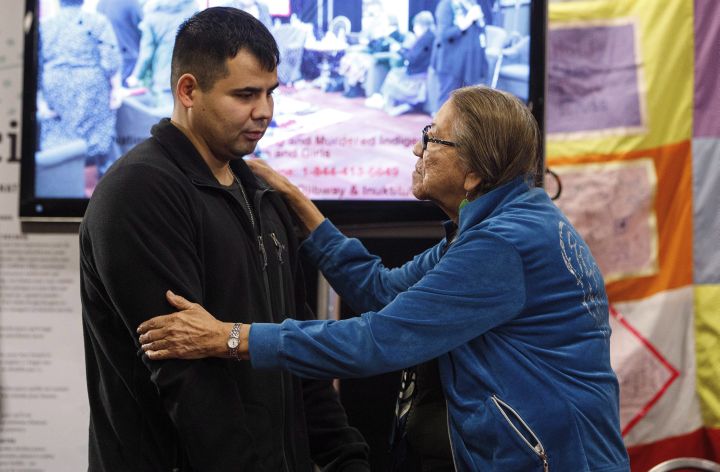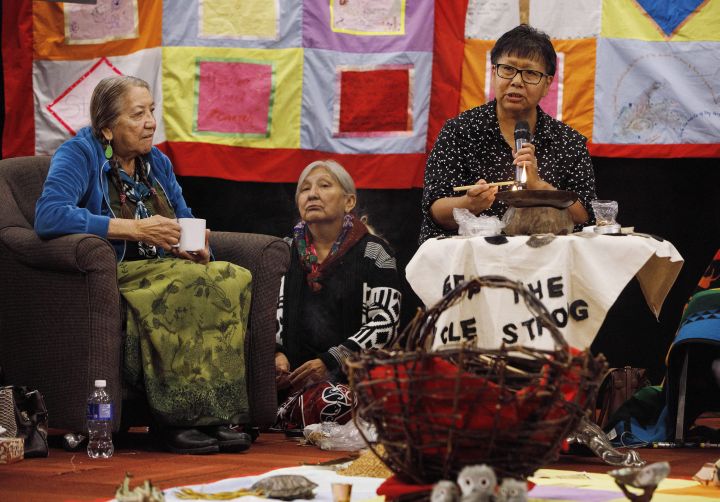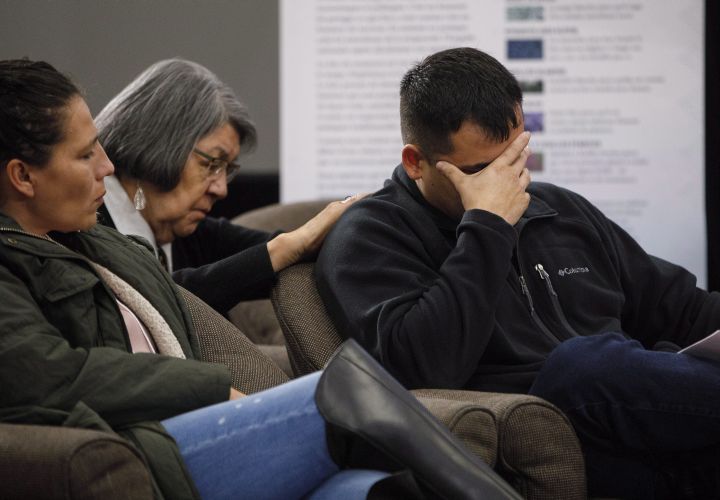As disturbing stories emerge at the national inquiry into missing and murdered Indigenous women and girls, it’s Melodie Casella’s job to ensure that testifying about trauma doesn’t simply create more.

“Our mandate is a no-harm approach,” Casella, health manager for the inquiry, said Wednesday on the second day of hearings in Edmonton.
“It’s families first.”
Casella runs an extensive mental-health network for the inquiry’s western swing. That network embraces witnesses long before they tell their stories to the inquiry’s commissioners.
READ MORE: Murdered Indigenous woman’s belongings destroyed by RCMP, brother tells inquiry
She said it is delicate work. Just because some members of a victimized family have chosen to speak, that doesn’t mean all relatives want to.
“We don’t make direct contact with families. If we were to make those direct calls, it could cause trauma on a family member,” she said.
“We don’t want to make any families feel pressured to come here when some family members would state, ‘I don’t want to go down that road.”’
READ MORE: MMIW inquiry’s B.C. hearing moves observers to tears
Casella speaks from experience. A member of her own family was murdered.
“There are family members in my own family who don’t want to go and share their truth. They say, ‘It’s been a long time and I just want to move forward in my life.”’
- Former Calgary gymnast speaks out in hopes of changing toxic culture of sport
- Calgary police host town hall on extortion threats targeting South Asian community
- Record-setting temperatures in Alberta prompt warnings about wildfire danger
- Bail decision looms for Calgary man facing extradition in Ryan Wedding case
For those who do choose to speak and ask for help getting through the experience, Casella makes sure they have support from local Indigenous groups and looks after them when they get to the inquiry.

Get weekly health news
Nobody is left alone. Casella said workers help witnesses try to build on the strength that got them this far.
Inquiry hearings are emotionally gruelling. Tears and anger are frequent.
To deal with the emotions, a team of six elders stand by. Mental-health workers, identified by purple shirts, sit in the audience to offer support to anyone needing it.
Witnesses are given a small bundle of tobacco at the end of their testimony. Many choose to take it to a sacred fired tended by an elder and burn it while offering prayers, Casella said.
Sometimes, she said, she does that herself. Inquiry staff live with story after story, day after day, and they have to look after themselves, too.
“The commission staff we have here, it’s like a family. We build each other up.”
Witnesses are also cared for after they testify. Casella tries to ensure they have support when they get back home, even in remote or rural locations.
“We have to ask and make sure they have somebody they can talk to.”
The inquiry maintains a toll-free, 24-hour support line.
“If they wake up in the middle of the night, that is available to them to call when they leave here.”
READ MORE: More than 900 people registered to speak to MMIWG inquiry
The inquiry’s interim report has concluded that enough stories about indifferent or sloppy investigations have emerged that some cases should be reopened. Whatever the legal consequences of the inquiry’s work, Casella said it’s having a profound effect on witnesses.
“Some of them had approached me after, saying this is the beginning of my healing. For some of them, it was over 30 years they had never talked about it.”
On Monday, one of the witnesses she coached through his testimony approached her afterward.
“(He said) I want to thank you for not giving up on me, for getting me through this. He was so happy and grateful.
“When we express and open up to talk about the issues that we harbour deep inside, it doesn’t belong to us any more.
“The Creator’s going to take care of that.”





















Comments